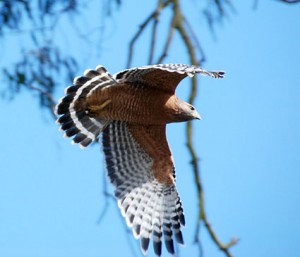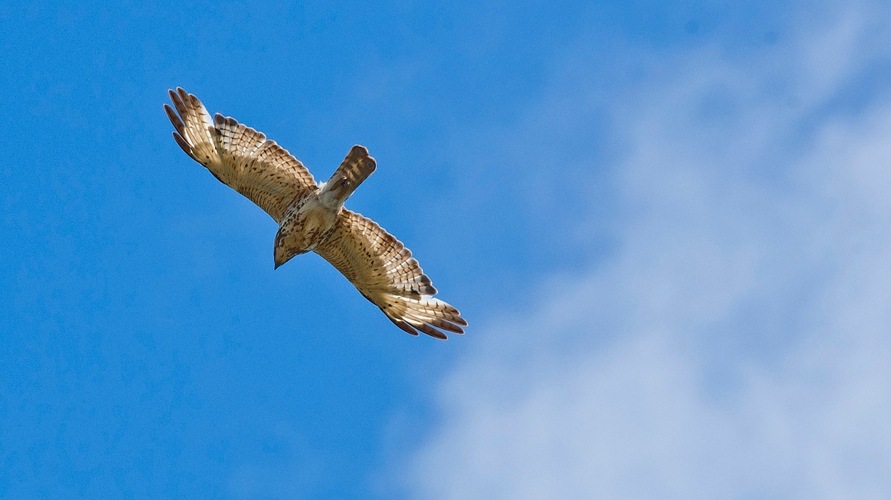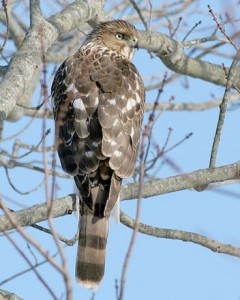Upstream, four turkeys glide across the gorge. It’s so unusual to see them in full flight that I don’t know what they are for a second. They’re not ungainly birds in the wild.One, probably the leader, perches on the highest point over a mirror-like pond in the stream far below. Within a few minutes I see them marching single file up the slope through the high brown grass of summer.
 The rains have begun, and it won’t be long before the hills are green again.
The rains have begun, and it won’t be long before the hills are green again.
To my right, below the lip of the vertical gorge, a huge volcanic slab sits perched on a narrow ledge. It’s about fifteen meters tall and split from top to bottom, with massive, sloping boulders above it, and sheer, dark blocks of rock just below. The next major earthquake will bring it crashing into the creek for sure.
At the end of a sitting, with intense but passive watchfulness just having spontaneously ignited a state of negation in meditation, a large, speckle-winged hawk swoops in and alights on a nearby branch.
It eats a few scraps of meat from its talons, holds its regal position for a minute or two, and then opens those magnificent wings again, dropping down and arcing up to a higher branch behind me. It doesn’t make a sound. It feels like a sign, but I’m skeptical—of what?
Later, as if to confirm my doubting-Thomas mind as I’m making a journal entry on a bench in the park, I hear a rustling in the grass and leaves behind me. It’s another woodland hawk of the same size and coloration, the first I’ve seen on ground. It’s very close, and at first I think it must be injured. But within a few seconds it takes off, without anything in its mouth as far as I can see.
The boundary between the silent consciousness of a human being, and the simple consciousness of animals becomes much more porous during states of negation in meditation. Animals seem to sense when the chattering mind gives way to complete awareness in the present, and welcome the human being back into the fold.
If one isn’t spontaneously giving thanks every day for some moment of beauty and joy (not pleasure or pensions), then sitting around the table with one’s family one day a year doesn’t amount to pile of turkey bones.
A good movie to watch with the family on the holiday, rather than a second or third damn football game, is “Tender Mercies,” probably the best movie Robert Duvall has made. It’s about a down-on-his-luck alcoholic country singer who stumbles into grace with a good woman and her son in some godforsaken place on the American plains. The youngish woman is widowed, and says little in words, but much in her ways.
The Duvall character’s daughter, who he hasn’t seen since she was a young child, finds him and comes to see her estranged father at his new home. At the end of their brief, poignant meeting, she says she remembers bits of a song he sang to her, something about “on the wings of a snow white dove.”
Duvall’s character lies and replies he doesn’t recall, not wanting to choke up. As she drives away he sings it at the window:
When troubles surround us
When evils come
The body grows week
The spirit grows numb
He doesn’t forget us
He sends down his love
On the wings of a dove
Or perhaps a hawk. After all, without a trace of cruelty or violence, cosmic intelligence is fierce like a hawk, not soft and white like a dove.
The world has always been a terrible place, but it has never been such a spirit-killing place as it is today. It’s often been said that if you look into the darkness, the darkness looks into you. But is there any choice anymore? We are all choking on the exponential growth of darkness in human consciousness. Indeed, it has become human consciousness.
But we can meet and dispel it within ourselves by bringing forth and remaining with our own portion of darkness, which is larger than ‘good’ people think, and smaller than ‘bad’ people believe. That is, those who see themselves as bad. The worst people are those who just don’t care.
I read a quote recently that expresses how I think, especially when I’m not thinking at all; and what I feel, when in a state of negation: “Organized religion, with its beliefs, dogmas and rituals, denies the open entry into the vastness of mind. It is this entry that cleanses the brain of space-time. Being cleansed, the brain can then deal with space-time.”
And space-time is the world, the consciousness of man, of which one is one.
Martin LeFevre


